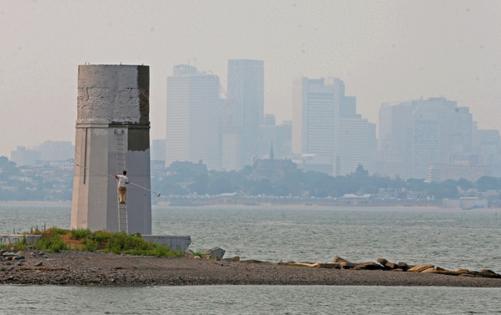Wildfire smoke could bring hazy skies to Massachusetts, possible air quality issues
Published in Science & Technology News
BOSTON — When the heat arrives this week, air quality may be dropping.
Wildfire smoke from Canada is expected to move into the region in a couple days — in an unfortunate repeat of last spring and summer.
“There could be a gradual increase in smokier skies over the next few days, with Wednesday having the greatest amount of haze,” National Weather Service meteorologist Francis Tarasiewicz told the Herald.
“The main impact will be haze in the sky,” he added. “Some of the smoke could make it closer to the surface, which could be tougher for those with respiratory issues.”
Last spring and summer, the wildfire smoke made it smell like the dump at times.
This round of wildfire smoke comes as temps suddenly shoot up close to 90 degrees. Temps are expected to be in the mid-80s on Wednesday, followed by around 90 degrees on Thursday.
“The first significant heat event of the year could catch folks off-guard who are outside working and recreating,” Tarasiewicz said.
The National Weather Service advises people to limit time outside during extreme heat, stay hydrated, and limit activities to mornings and evenings.
According to AccuWeather, large wildfires have been scorching thousands of acres in British Columbia, Saskatchewan and Manitoba. Like last year, winds are bringing the wildfire smoke down into the U.S.
“Most of the time, the smoke will be high-flying and dim the sun, leading to vivid sunrises and sunsets and causing a hazy appearance to the sky overhead,” AccuWeather Meteorologist Brandon Buckingham said.
“However, there will be episodes where the smoke can reach the lower levels of the atmosphere and affect visibility and air quality,” the meteorologist added. “That could be a safety concern for travel in extreme cases and pose health problems for some individuals with respiratory issues.”
The wildfire smoke may prompt health advisories in many cities and states.
In Canada, more than 25,000 residents across three provinces have been evacuated due to the worsening air conditions.
The Syracuse University Center of Excellence in Environmental and Energy Systems is advising residents to take simple steps to protect indoor air quality and personal health in the event of increased smoke levels.
“Get ready ahead of time by purchasing or borrowing a HEPA air cleaner and/or a higher-efficiency furnace filter, and masks for going outdoors,” said Syracuse University Professor Ian Shapiro.
His air quality recommendations include: use air cleaners with HEPA filters; run HVAC fan continuously; close windows and doors to keep out smoke; limit use of exhaust fans; and wear a mask outdoors especially if air quality worsens.
_____
©2025 MediaNews Group, Inc. Visit at bostonherald.com. Distributed by Tribune Content Agency, LLC.







Comments